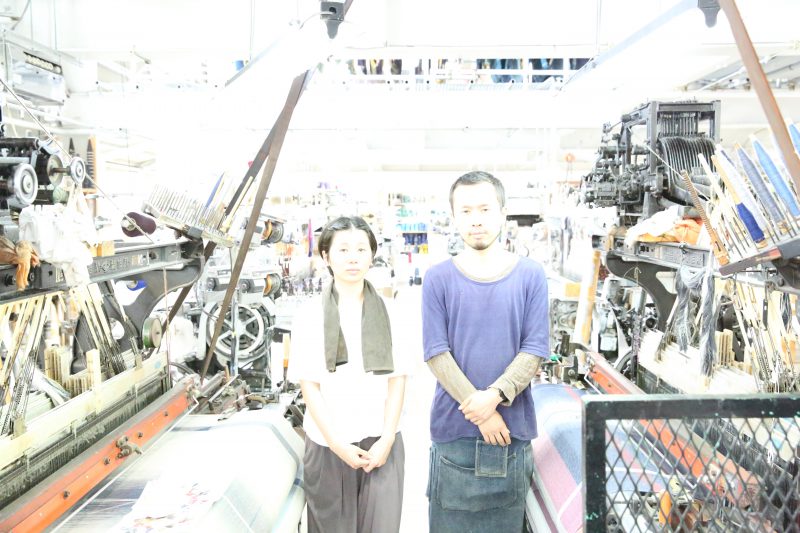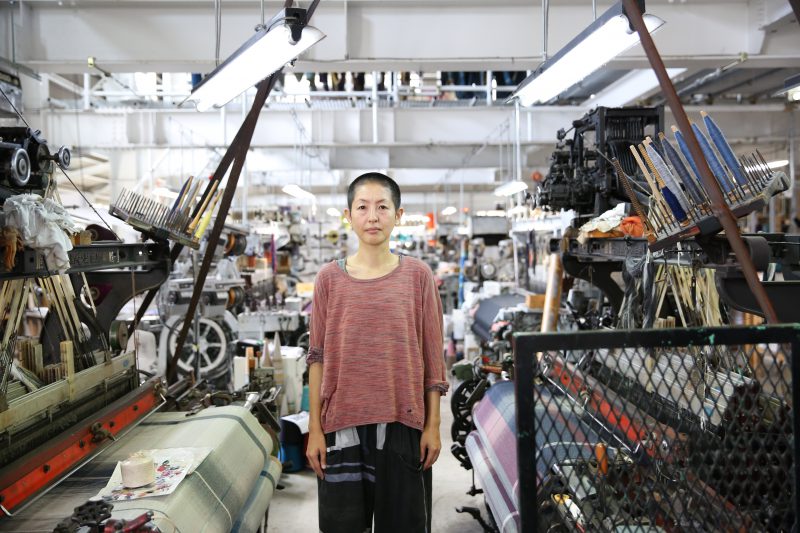niime 百科
Encyclopedia of niime
「新雌」であること。
Being "新雌(niime)."

2019 . 07 . 01
「女性が活躍できる、新しい社会を創っていきたい。」
そう常々語る玉木新雌の「新雌」という名には、“新しい女性像”を表現し提案してゆきたいという玉木の想いと決意が込められている。
今回は女性であること、新雌であることを巡ってのトーク・セッション。そして1点モノのモノづくりが備える、深い意味と価値について。
玉木「先日、関西学院大学の井垣伸子博士が『秘書力』という本を書かれた井出元子を連れてウチを訪ねて来て下さってお会いしたんですけど、Shop & Labを観て愉しんで頂いた後に女3人の討論会がその場で始まって。色んな話をして、そこでのキーワードが“これからの時代は女性が頑張らなあかん”と。新雌という名にもビビッと来ましたって言って下さって。」
― 高い意識を持つ女性3者の会話だったんですね。改めて玉木さんが自らを「新雌」と名乗った理由のところを聞かせてください。
玉木「昔から女だから男だからという言葉には異常に反応してましたね。なんでなのかはわからないけど。それは前世で女性として迫害を受けたからだってある人には言われたけど。新しい女性像を創ろうとかって、あえて言わなくても、どうでも良いといえばどうでも良いことでしょう?私の父の名前には雄の字があるから逆に私は雌にしようと。男性に対する対抗意識みたいな。常に思っているのは、この世の中で差別とか何であるんだろう?と疑問で。平等で良いじゃんと思っちゃう。わからないから答えを知りたくて、もがいてるのかも知れないけどね。私はこうなんだけど、どう思う?という問いかけの意味も込めて“雌”の字をつけてるんだろうね。」
― あえて「新雌」と名乗ることで女性のあり方について皆の意識を向けることにも繋がっていくと。
玉木「私自身は特にこれまで女性として迫害を受けたわけでもないけどね。女のくせに仕事するなとか女だから嫁に行けとか言われなくなって来た世代でしょう?親にもそんな事言われずに育ててもらって好き放題させてもらってるし、でも現実問題まだまだあるじゃないですか。女だから、という部分が。」
男女雇用機会均等法が改正され、それまでは努力目標であったのが、募集・採用、配置・昇進など労働条件に男女差をつけることが禁止されたのが1999年のこと。その数年後、玉木は繊維商社に就職し社会人となる。
玉木「でも私が会社に勤めてた頃には、お茶くみは女の役割だとか、そんな暗黙のルールがまだ当時としてはあったと思うんですよね。徐々には無くなっていって、時代が変わりつつあるんだなというのは肌で感じてはいたんだけど、女が結婚して仕事を辞めるという時代じゃなくなって、結婚したとしても育休後に復帰できるという世の中になると感じてた。男より強くなるというんじゃなくて、男性に寄りかからないと生きていけないという依存関係ではなく、やっぱり自分の足で一人で立つっていうぐらい強くないと、これからは生き残っていけないなという気持ちはあったので、そんな想いを自分の名で表現したというか。」
― tamaki niimeとしてのモノづくりやブランドの在り方からは、男性には無い女性ならではの良さを引き出していこうという姿勢も感じます。
玉木「男だから女だからと思ったことは無いんですけど、色糸選びやってもらったら女性の方が色の識別が豊富に出来る人が多かったりだとかはありますね。でも、播州織に限らずこのアパレルの世界に入って、お客さんがほぼ女性なのに、社長や営業とか機織職人は男性ばかりなんだなと思ったの。だから、“わかるの?”と。女の私なら好きか嫌いか、お金出したいモノとそうでないモノがハッキリしてて、その直感を信じて創ればいいと思うけど、嫁が買うか買わないかという基準で考えちゃうといちいち聞かなくちゃいけないから。
何かゼロからモノをつくるって、色々な選択をしていくことで、全てがその組み合わせでしょう?その過程でひとつでも間違えたら良く無くなっちゃうって考えると、やっぱり感覚的にわかっている女性の方が早いよね、とは思った。もちろん、得意・不得意や男性・女性それぞれの良さはあると思うから、全部を女がやるのがいいって思ってるわけじゃないんですけど、もったいないな、と思ったの。売り場では女性が売ってるけど、営業は女性じゃないんだとか、もっと遡って生地をつくる・織るっていうところと女性の感性が繋がると着心地のいい服が出来るだろうに、アイデアは男性が勝手に考えてるだけなんだってなると、なんで?って。それよりその販売している女の子が着たいものをつくらせてあげた方がよっぽど早いんちゃうん?って思って。」
― 同じ女性のお客様と直に関わる彼女たち自身のアイデアで、ですね。
玉木「昔はそうだったの。家でお母さんが子どもたちのために手織りとかして。子どものために旦那さんのために自分の好きなように織ってたわけだから。」
― かつては我が家も子ども服は母が作ってくれてました。
玉木「昔はお母さんが服のことを決めてたと思うから。それが元々のかたちだと思うのに。」
― そう考えてゆくと、すごく暮らしに密着した服づくりという視点が出て来る気がしますね。
玉木「原点回帰なんだと思うの。親からの贈りもの、それは一点モノだから。愛情が注がれているモノには、やっぱり愛着が湧くし。それが大量生産の時代になり消えていって、私の幼稚園の頃にはお母さんに洋服を作ってもらえる子が羨ましいみたいな。」
― 私の場合は昭和の高度成長期の子どもで日本が消費社会に入る頃に育ったので、服を買ってもらえる事に羨ましさがあったと思うんです。
玉木「こっちはもう大量生産・大量消費のシステムが完成しちゃっている時代だから、逆にお母さんに余裕があって専業主婦で服を縫えるという方がリッチな感じがあった。」
― 真逆ですね。
玉木「それしか作れないからじゃなくて、お母さんの余暇をそれに投入出来るってゆう。だから、大量生産ではないモノの良さってゆうのが私たちが子どもの頃には芽生えて来てた。まだ少なかったけどね。でもその当時はまだミシンも一家に一台あってお母さんたちが手縫いも出来て、忙しいけどちょっと意識すれば自分で縫える時代だったんですよ。それが今や家にミシンなんて無いでしょう?家庭科の授業も縮小される傾向があるし、ミシンを使えない人も出て来ちゃってる。」
― 今の話を聞いてすごく思うのは、tamaki niimeのブランドとしての取り組みというのは時代の最先端であり原点回帰でもあるんだということですね。
玉木「いや完全に“原点”でしょう。その原点の方が絶対にいいって思うんです。」
― 一点モノのモノづくりってゆうのは人の暮らしの“原点”に帰着するんだなと。
玉木「大量生産・大量消費というのは、効率化は成されるから、ビジネスとしてはいいんだと思うんだけど、ひとりの人間としてモノに対する愛着とか、モノを大切にするという気持ち自体はやっぱり…薄れていったでしょう?…多分、ビジネスという視点で考えちゃうから、そんな非効率なことやってられるかとなっちゃうのかなと。」
母親が家族を想い服を縫う、昔ながらの手づくりにも通じる、手間暇かけたふたつとないモノづくり。理屈抜きに、その価値に対しての確信が玉木にはある。
tamaki niimeの在り様というのは、男性主導によって上昇志向・効率最優先で突き進んで来たこれまでの社会のあり方への、玉木流のしなやかな異議申し立てでもあるのかもしれない。
玉木「織機だってそうで、最新の機械を開発していかにミス無く効率的に、完璧なモノを織れる様にしていくかって考え方だから、私たちの求めてる着心地が良くて柔らかくて心地よいモノってゆうのはそこからは生まれなんだなというのは感じたし…面白いね。」
― そこをショールというカタチでバッと世に出した時に、あ、そうそう、これこれ!ってなった人が大勢いたんだと思うんです。
玉木「共感出来る人が多かったのかもしれないね。そうかも知れない。こんなの待ってたというか。」
― すごいブレイクですよね。ビッグバン的な。
玉木「ほんと有り難かった。私、自分が思ってることって皆んなも思ってるって考えてて、100パーセント皆んなおんなじ様な思考回路だと思ってたんだけど、全くそうじゃないんだと知ってびっくりしちゃったんだけどね。皆んな同じ想いだと思ってたからこそ変に自信があったのかもしれない。」
― 皆んなが潜在的には思ってたことを具現化してくれた、ということなんじゃないでしょうか。
玉木「本当に良かった。共感してもらえて。」
玉木によるマニアックなモノづくりの追求は、無意識のうちに、多くの女性たちが待ち望んでいた柔らかな質感や手触り、カラフルな色合い、心地良い“何か”を追い求めることと重なり合っていたのだろう。
今の・これからの社会で女性が自立し、どう生きてゆくかの問いかけが玉木の内では常になされ、それを受けての様々な実践がtamaki niimeのブランドの在り方とモノづくりには色濃く反映されている。
そしてアイコンとして、そんな取り組みを続ける玉木新雌自身が引き受けているのは、新しい女性像の具現化した姿なのだと思える。
女性たちを活き活きと輝かせながら、tamaki niime 玉木新雌はこれからも進化し続けてゆく。
書き人越川誠司
”To create a new society where women can shine.”
That’s Tamaki Niime regularly mentions. She puts her heart and determination into the name “新雌(niime)” that she would like to express and propose “the new female image.”
This time, the talk session is about being a woman; being “新雌(niime)”. And about the meaning in depth and value that the only creation has.- Tamaki
- “The other day, Dr Nobuko Igaki of Kwansei Gakuin University visited us with Motoko Ide, author of the book “Secretarial Power.” After enjoying a tour of the Shop & Lab, We, three women immediately started conversing right there about various subjects. The key concept was “Women should keep challenging in the new era.” She said she felt in tune with the name 新雌(niime) .”
the name 新雌(niime) made her heart jump
– It must have been a conversation between three women with great awareness. Would you tell me the reason you named yourself 新雌(niime) again?
- Tamaki
- “I’ve always elicited an unusual reaction to the phrase because of men or women. I don’t know why. Someone said because I was a persecuted woman in my previous life. Anyway, you usually don’t talk about making a new female image. You don’t have to mention it, but my father had “雄(male)” for his name, so I felt I needed “雌(female)” for mine. It was like a rivalry with men. I always asked myself; why do we have discrimination? I think equality is good. I’ve been struggling to know the answer. This is how I feel, but what do you think? That’s what I would like to ask people, so I guess I use “雌(female)” specifically.”
– If you dare to call it “新雌(new female)”, it would also lead to everyone’s awareness of the way women should be.
- Tamaki
- “I have not particularly been persecuted as a woman, though. I am a generation who has not been told to get married or not to work because I am a woman. My parents didn’t say such things while I was raised and I’ve been left to my own choice. However, realistically speaking, I think there is still problem with discrimination against women in society.
- Tamaki
- “When I was an employee, however, serving tea was a female role. It was an unspoken rule back then. Eventually, it was fading out, and I experienced that time was changing; women gradually not to quit their job to get married. Even if they get married, they can get back to work after maternity leave. I felt it would become a social trend. It doesn’t mean that women should be stronger than men but to be independent; women used to rely on men. It should be not a dependent relationship that women cannot live without men, and women should be strong enough to stand on their own feet to survive in the new era. That’s I would like to express with my name.”
– From the way of creation and the brand as tamaki niime, I feel the attitude that you are trying to draw out the value only from women have that men do not have.
- Tamaki
- I’ve never thought of being a woman or being a man; however, when it comes to choosing colours, more women have better colour identification. Not only Banshu-ori but in the world of the apparel, even though customers are almost all women, the president, sales and weaving artisans are most likely men. So I wanted to ask them if they understood. It is clear for me if customers like it or not if they’re going to pay for it or not, because I am a woman. I have a third eye. I have to follow it to create; however, men have to ask if their wife would buy it or not. To create things from zero, we have to make various choices, and everything is a combination, right? If you make a mistake in the process, it will not be a satisfying creation any more. So I felt that women are superior because they understood sensuously. Of course, I do not think that it is suitable for women to do everything, and I understand each person’s strong point and weak point, and good points that men or women have. I thought that it was kind of wasteful. For example, salespersons are women at the store, but sales reps are not. Or even making and weaving fabrics should be linked to female sensibility to create more comfortable clothes. So I don’t understand why only men think about the idea. It would be faster if we let the saleswomen make their own favourite clothes (to wear).”
– Their original ideas that are directly related to female customers, right?
- Tamaki
- “It used to be that way clothes were made. Mothers hand-woven for their children at home. They wove for the children and husband in their own favourite way.”
– My mother used to make children’s clothes in my family as well.
- Tamaki
- “Mothers used to make a decision about clothing a long time ago. That was an original form.”
– Thinking in that way, we’ll get to the concept of creating clothes focusing on life.
- Tamaki
- “I guess it’s the original. It is a gift from parents; the only one. People love something that is loved. It faded out because of the mass-production trend. When I was in kindergarten, people were jealous of children whose mothers made handmade clothes.”
– In my case, I grew up during Showa’s high-growth period when Japan became a consumer society, so I was jealous of the children who got ready-made clothes.
- Tamaki
- “On the other hand, I was raised when the mass production and consumption systems were already set. So, I felt it’s more wealthy that full-time homemaking mothers who have more time to make clothes for her family.”
– That’s totally opposite.
- Tamaki
- “It’s not because mothers had to make them, but it is because mothers have leisure time to do it. So, when we were children, we had a sense of quality things that are not mass-produced. Not many people had that kind of thought. Back then, however, there was still a sewing machine in the family and mothers could do hand-sewing. Even if mothers were busy, they could sew clothes if they were a little conscious. That was the time. Now, however, there is no longer a sewing machine at home. Home economics class is being reduced, and some people cannot use sewing machines any more. “
– Listening to your story, I realized that tamaki niime’s trials as a brand are the cutting edge of the era and also fundamental to the origin.
- Tamaki
- “Actually, it’s definitely the “fundamentals”. I think that the origin is absolutely better.”
– The only creation is to return to the “fundamentals” of people’s lives.
- Tamaki
- “I think that mass production and consumption are good for business because efficient; however, the affection and the feelings to cherish things are… fading away…maybe because in terms of business, it would be such an inefficient thing.”
The whole concept of tamaki niime may be a soft rejection of society; the current course which has been driven by a patriarchal initiative with an emphasis on rising and efficient priority in Tamaki’s way.
- Tamaki
- “Even with looms, the idea is that to develop the latest machines to avoid mistakes and to weave perfect textiles efficiently in the fashion industry. I felt that soft and comfortable creations will not be born from there …it’s kinda interesting.”
– When the shawl was released, I believe there were a lot of people who felt “Oh, yes, this is it!”
- Tamaki
- “They might have felt the same way. I think they were waiting for it.”
– It’s a big hit, isn’t it? Like the Big Bang.
- Tamaki
- “I really appreciated it. I used to believe everybody was thinking about what I was thinking. I thought we had 100% same mindset; however, I was surprised to know that it was not like that at all. I had a strong self-confidence because I believed in it.”
– You have embodied what everyone had thought potentially, haven’t you?
- Tamaki
- “I’m very glad people like it.”
Tamaki always asks herself that how women should stand and live in a society now and in the future, and that is strongly reflected the various practices in which the way of the tamaki niime brand and creation.
And as an icon, Tamaki, who continues such efforts, is taking on the form of a new female image.
tamaki niime (玉木新雌) will continues to evolve, making women lively and shine.
Original Japanese text by Seiji Koshikawa.
English translation by Adam & Michiko Whipple.


